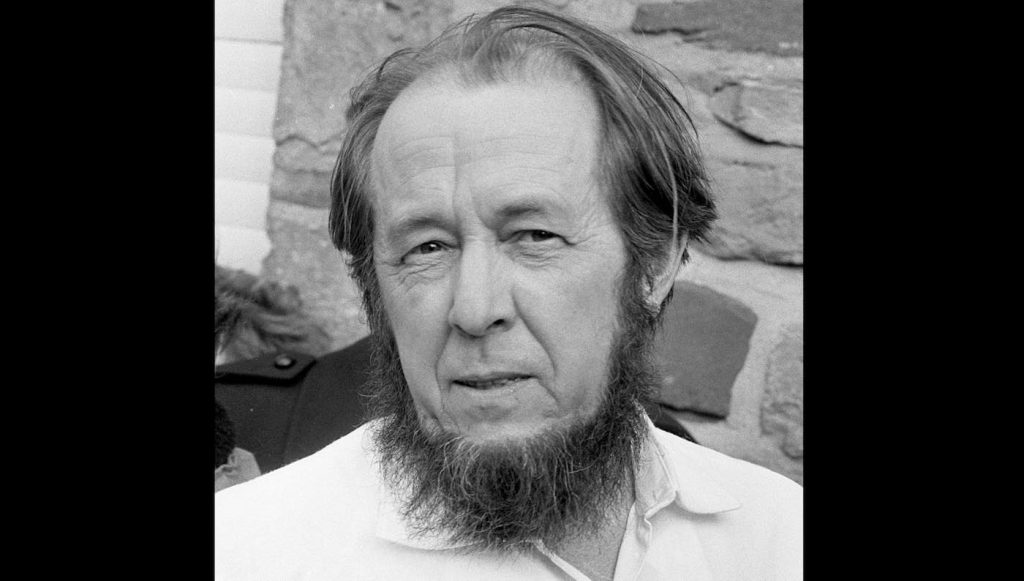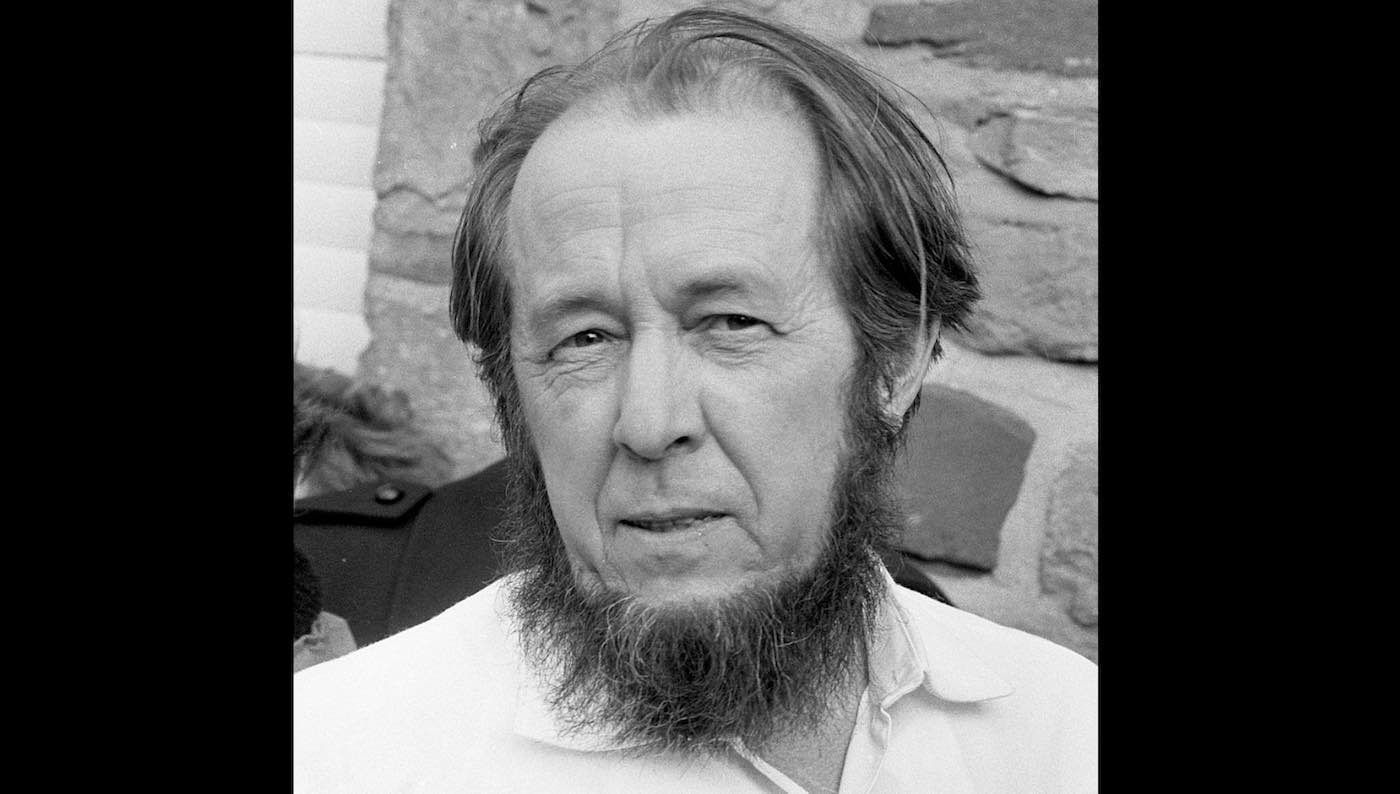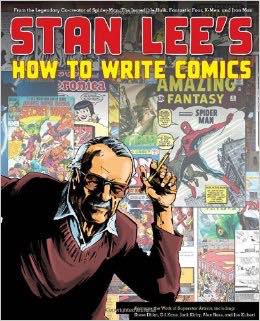51 years ago today, Aleksandr Solzhenitsyn published The Gulag Archipelago, a literary investigation of the prison-labor camp system in the Soviet Union between 1918 and 1956 that forever destroyed the credibility of communism. This Nobel Prize-winning book, which has been called the single greatest indictment of a political regime ever written, and the best non-fiction book of the 20th century, was based on Selzhenistsyn’s own “tenner” or ten-year prison sentence in a labor camp in Siberia, and included a broad range of testimony from the men he met there and elsewhere after he was released, as well as legal documents. First published in the West in 1973, it required decades of hiding from the KGB. READ more about this one-of-a-kind book… (1973)

After the KGB had confiscated Solzhenitsyn’s materials in Moscow, during 1965–1967, he worked to develop his preparatory drafts of The Gulag Archipelago into a finished typescript. He accomplished some of this while in hiding at his friends’ homes in the Moscow region and elsewhere.
While held at the KGB’s Lubyanka Prison in 1945, Solzhenitsyn had befriended Arnold Susi, a lawyer and former Estonian Minister of Education, who had been taken captive after the Soviet Union occupied Estonia in 1944. Solzhenitsyn entrusted Susi with the original typed and proofread manuscript of the finished work, after copies had been made of it both on paper and on microfilm. Susi got the manuscript to his daughter, Heli Susi, who kept the “master copy” hidden from the KGB in Estonia until the dissolution of the Soviet Union in 1991.
Although he had earlier wanted it published in Russia first, Solzhenitsyn decided to allow its publication in Paris after the death of one of his confidantes. The first edition of the work was published in Russian by the French publishing house Éditions du Seuil. News of the nature of the work immediately caused a stir, and translations into many other languages followed within the next few months.
The book itself is not a work of documentary, nor history, but Solzhenitsyn described it as an “experiment in literary investigation,” perhaps to excuse some obvious bias and reliance on technically unreliable sources. But Soviet dissident and historian Roy Medvedev, who said the book was full of contradictions, added that the work “is full of thoughts and observations, some profound and true, others perhaps not always true but born in the monstrous sufferings of tens of millions of persons.”
“I believe there are few who will get up from their desks after reading this book the same as when they opened its first page. In this regard I have nothing with which to compare Solzhenitsyn’s book either in Russian or world literature,” wrote Medvedev.
Particularly chilling is the first chapter, entitled “Arrest” in which Solzhenitsyn writes that half of all the political prisoners in Russia fell into the Gulag system without ever being able to mount any kind of response or recognize what was happening because of their own good will and civic-mindedness, and that, when soldiers arrive and declare at the front door in the middle of the night “you are under arrest,” the instinctive response that “there must be some mistake,” and that a trip to the station should sort all this out, was a whole generation’s undoing.
MORE Good News on this Date:
- Westminster Abbey was consecrated (1065)
- Cyrano de Bergerac, an Edmond Rostand play, premiered in Paris – about a real-life French dramatist and his nose (1897)
- The Peak District became the UK’s first National Park (1950)
- President Richard Nixon signed a strengthened version of the Endangered Species Act, which led to the recovery of the bald eagle and other species (1973)
- The first American test-tube baby, Elizabeth Jordan Carr, was born in Norfolk, Virginia (1981)
- Nepal‘s parliament abolished the country’s monarchy to replace it with a democratic Republic (2007)
Happy Birthday to Denzel Washington who turns 70 today. The acclaimed actor grew up in blue-collar households in Mount Vernon, New York, and Florida, after which he attended university and discovered his talent for acting while working at a summer camp. He went on to win a Tony and two Academy Awards: Best Supporting Actor for the historical war film Glory and Best Actor for the crime thriller Training Day.

Denzel’s consistently stellar performances since the 1980s included many portrayals of real-life figures such as anti-apartheid activist Steve Biko in Cry Freedom, the boxer Rubin Carter in The Hurricane, the Virginia High School football coach who fought racism in Remember the Titans, the Muslim civil rights activist Malcolm X, and the educator Melvin B. Tolson in The Great Debaters—a movie he also directed.
His third film as a director, Fences, in which he also starred in 2016, was nominated for a Best Picture Oscar.
A devout Christian, he’s been married for 38 years to Pauletta Pearson, and has served as the national spokesperson and a board member for Boys & Girls Clubs of America for over a quarter century. He’s done so much for one New York City public elementary school that they decided to officially rename their school after him. WATCH Denzel accept the AFI Lifetime Achievement Award… (1954)
And, 102 years ago today Stan Lee, the Marvel Comics writer and publisher who co-created Spider-Man, the Incredible Hulk, Iron Man, Thor, X-Men, and the Fantastic Four, was born.

He introduced a thoroughly shared universe into superhero comic books, and – with his knack for business – rose from being a lowly assistant who filled ink wells to the president and chairman responsible for transforming Marvel Comics from a small division of a publishing house into a large multimedia corporation.
Marshaling his childhood ambition to be a writer, young Stanley Lieber made his comic-book debut with the text filler “Captain America Foils the Traitor’s Revenge” in Captain America Comics #3 (May 1941), using the pseudonym Stan Lee. His initial story also introduced Captain America’s trademark ricocheting shield-toss.
Charged with creating a new superhero team in the 1950s for the company, which was then known as Atlas Comics, Lee created the Fantastic Four, and gave them human frailties complexities–a first for the industry. His characters could have bad tempers, fits of melancholy; and they bickered amongst themselves, worried about paying bills or impressing girlfriends, and even got physically ill. The comic’s popularity led to Lee’s creation of a string of new characters, including the Hulk, Thor, Iron Man, and the X-Men.
In the 70s, Lee began using comic books for social commentary, which often dealt with racism, discrimination, intolerance, or prejudice. He also introduced the practice of regularly including a credit panel on the splash page of each story, naming not just the writer and penciler but also the inker and letterer. Before he died in 2018, he had overseen the charitable Stan Lee Foundation since 2010 to focus on literacy, education and the arts, written a how-to book for writing comics, and introduced his digital graphic novel God Woke at the 2016 Comic-Con International. (1922)
Happy 46th Birthday to John Legend, the singer–pianist–composer who recently became the 15th person (and first black man) ever to achieve EGOT status (winning an Emmy, Grammy, Oscar, and Tony), after he was honored as a producer on the musical Jesus Christ Superstar Live.

He scored his first big hit in 2005 with ‘Ordinary People,’ and has won 10 Grammy Awards. Legend has also collaborated with dozens of artists, such as Jay-Z and Kanye West. His song ‘Glory’ (with rapper Common) nabbed the Oscar for Best Original Song after being featured in the film Selma. Legend’s 2013 single ‘All of Me’ from his fourth studio album—Love in the Future—became a Billboard No.1 hit. (1978)
129 years ago today, what is believed to be the first paid audience for a motion picture saw 10 short films by the Lumière brothers in Paris—the birth of cinema.

Auguste and Louis Lumière started in the film business as manufacturers of photography equipment, best known for their Cinématographe motion picture system. Their history-making film presentations—about 9 minutes long in total, including 46 seconds of Workers Leaving the Lumière Factory—were produced by hand-cranking their films through a projector.
WATCH the first cinema, including feeding a baby, a hose prank pulled on a gardener, and men pouring drinks while playing cards. (1895)
SHARE the Milestones, Music, Movies, and Memories…






















[…] post Good News in History, December 28 appeared first on The Good News […]
[…] post Good News in History, December 28 appeared first on Good News […]